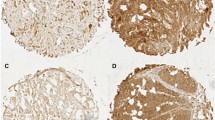Abstract
The protein and mRNA expression of dysadherin was studied in a series of squamous cell cervical carcinomas, and their clinicopathological associations and prognostic value were explored. Immunohisto-chemistry was used to assess protein expression of dysadherin in 206 patients with squamous cell cervical carcinoma, FIGO stage Ia-IVb. Frozen tissues from 20 cases in which the tumors showed variable dysadherin protein expression were used for laser capture microdissection (LCM) and processed for RT-PCR detection of dysadherin mRNA. Immunohisto-chemically, all the dysadherin-positive staining was membranous. Positive cell membranous dysadherin-positive staining was often observed at the edge of tumor nests, although strong immunoreactivity throughout whole tumor nests was also seen in some tumors. Basal cells of the normal cervical epithelia were positive for dysadherin while its expression in the squamous cell cervical carcinomas was variable. Among the 206 tumors, 23 (11.2%) were negative, 53 (25.7%) were scored 1+, 54 (26.2%) were scored 2+ and 76 (36.9%) were scored 3+. In the 20 tumors analyzed, mRNA expression of dysadherin basically corresponded to its protein expression. No significant cor-relation between expression of dysadherin and age, FIGO stage or lymph node status was observed. Higher level of dysadherin expression, however, was significantly associated with shorter overall survival (p=0.04). We conclude that there is dysadherin protein expression in basal and parabasal cells of normal cervical epithelia, and higher level of dysadherin protein expression in squamous cell cervical carcinoma is predictive of a shorter overall survival, indicating that dysadherin may be a valuable prognostic marker in cervical carcinoma.
Similar content being viewed by others
References
Jemal A, Murray T, Samuels A et al: Cancer statistics, 2003. CA Cancer J Clin 53:5–26, 2003
Flores-Luna L, Salazar-Martinez E, Escudero-De los Rios P et al: Prognostic factors related to cervical cancer survival in Mexican women. Int J Gynaecol Obstet 75:33–42, 2001
Kawagoe T, Kashimura M, Matsuura Y et al: Clinical significance of tumor size in stage IB and II carcinoma of the uterine cervix. Int J Gynecol Cancer 9:421–426, 1999
Hirohashi S, Kanal Y: Cell adhesion system and human cancer morphogenesis. Cancer Sci 94:575–581, 2003
Birchmeier W. E-cadherin as a tumor (invasion) suppressor gene. Bioessays 17:97–99, 1995
Christofori G, Semb H: The role of the cell-adhesion molecule E-cadherin as a tumor-suppressor gene. Trends Biochem Sci 24:73–76, 1999
Yoshiura K, Kanai Y, Ochiai A et al: Silencing of the E-cadherin invasion-suppressor gene by CpG methylation in human carcinomas. Proc Natl Acad Sci USA 92:7416–7419, 1995
Graff JR, Gabrielson E, Fujii H et al: Methylation patterns of the E-cadherin 5’ CpG island are unstable and reflect the dynamic, heterogeneous loss of E-cadherin expression during metastatic progression. J Biol Chem 275:2727–2732, 2000
Becker KF, Atkinson MJ, Reich U et al: E-cadherin gene mutations provide clues to diffuse type gastric carcinomas. Cancer Res 54:3845–3852, 1994
Matsuyoshi N, Hamaguchi M, Taniguchi S et al: Cadherinmediated cell-cell adhesion is perturbed by v-src tyrosine phosphorylation in metastatic fibroblasts. J Cell Biol 118:703–714, 1992
Ino Y, Gotoh M, Sakamoto M et al: Dysadherin, a cancer-associated cell membrane glycoprotein, down-regulates E-cadherin and promotes metastasis. Proc Natl Acad Sci USA 99:365–370, 2002
Aoki S, Shimamura T, Shibata T et al: Prognostic significance of dysadherin expression in advanced colorectal carcinoma. Br J Cancer 88:726–732, 2003
Shimamura T, Sakamoto M, Ino Y et al: Dysadherin overexpression in pancreatic ductal adenocarcinoma reflects tumor aggressiveness: relationship to e-cadherin expression. J Clin Oncol 21:659–667, 2003
Sato H, Ino Y, Miura A et al: Dysadherin: expression and clinical significance in thyroid carcinoma. J Clin Endocrinol Metab 88:4407–4412, 2003
Pecorelli S, Odicino F: Cervical cancer staging. Cancer J 9:390–394, 2003
Tsuiji H, Takasaki S, Sakamoto M et al: Aberrant O-glycosylation inhibits stable expression of dysadherin, a carcinomaassociated antigen, and facilitates cell-cell adhesion. Glycobiology 13:521–527, 2003
Adams CL, Nelson WJ, Smith SJ: Quantitative analysis of cadherin-catenin-actin reorganization during development of cell-cell adhesion. J Cell Biol 135:1899–1911, 1996
Carico E, Atlante M, Bucci B et al: E-cadherin and alphacatenin expression during tumor progression of cervical carcinoma. Gynecol Oncol 80:156–161, 2001
Author information
Authors and Affiliations
Corresponding author
Rights and permissions
About this article
Cite this article
Wu, D., Qiao, Y., Kristensen, G.B. et al. Prognostic significance of dysadherin expression in cervical squamous cell carcinoma. Pathol. Oncol. Res. 10, 212–218 (2004). https://doi.org/10.1007/BF03033763
Received:
Accepted:
Issue Date:
DOI: https://doi.org/10.1007/BF03033763




